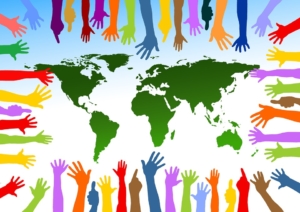
Oneness
Union and unity
or, at least the potential of it
exists
within ourselves
and with and among each other
and with the Divine.
We are more alike than we are different.
We are all made of the same ‘stuff,’ the same stuff as the stuff of the earth and the stars.
As we hear spoken at Mass on Ash Wednesday, from the Old Testament:
From dust we came and to dust we shall return. (Genesis 3:19)
And, as set forth in the New Testament, we are reminded that:
A house divided against itself cannot stand. (Mark 3:25)
Also, as Americans we’ve often heard repeated this pre-revolutionary war era rallying cry:
United we stand; divided we fall. (“The Liberty Song,” by John Dickinson (1768))
Each of us has this one life to live – staying true to ourselves and our convictions, and with our own sense of right and wrong – while also living as members of our increasingly globalized society.
So, why do we so often seem to be hell-bent on finding ways to emphasize our differences in such a way that, rather than uplifting each other, threatens to cut each other down, and keep us separated? Why must we do so in ways that are disrespectful and even dare I say dehumanizing?
To do so, is to forget an important spiritual principle, as so eloquently set forth in Yogi Bhajan’s First Sutra of the Aquarian Age:
Recognize that the other person is you.
I have this sutra, included in the list of all five sutras, posted on a wall right next to my bathroom mirror. It reminds me of the mirror, if you will, that each of us is of each other and for each other. (For more on this First Sutra, go here.)
How We Express Ourselves To One Another
On social media, I find it challenging. I may not always, and may not ever, truly get it ‘right.’ I do approach it with the intention, however, of striking some sort of proportionate distribution among: raising awareness and shining a light on issues that matter to me in this world, and doing so without inflicting harm, shame or blame on another – especially on anyone in the private sphere. Elected and appointed officials, in my opinion, are subject to a bit more scrutiny, although there too I do my best to raise awareness, clarify facts, and share my point of view in a way that’s not focused on shaming the person on a purely personal level.
 For the most part, I look for examples of what I’d like to “see more of” in the world. By contrast, I suppose that in so doing, I’m also pointing out what I’d like to see “less of” in the world – and yet, why give extra mileage to those things, is my thinking? Haven’t those negative things already gained more than enough traction?
For the most part, I look for examples of what I’d like to “see more of” in the world. By contrast, I suppose that in so doing, I’m also pointing out what I’d like to see “less of” in the world – and yet, why give extra mileage to those things, is my thinking? Haven’t those negative things already gained more than enough traction?
Sometimes, by design, I take a moment to reflect, and refrain from posting anything at all. It’s not that I don’t care. Sometimes, I feel maybe I care too much? Is there such a thing as caring too much? I don’t know, really. I do know that often there is much more to be learned from listening than from telling, and certainly more to be gained by showing compassion rather than by “making a point” in a way that’s browbeating and berating to another.
As I write this, I’m reminded of the proverb: There but for the grace of God, go I.
We never fully know what another person’s experience or conditions may be. We can only hope to heed even but the briefest moments and garner but the slightest glimpses of understanding. What would we do if we were in their particular situation or living within their particular circumstances? What if the roles were reversed? I am not suggesting that I have it all figured out. I do know, though, that at least I’m trying to be conscientious and expressing myself with a certain level of decency while also maintaining my sense of advocacy on behalf of those values and ideals I hold most dearly. It’s an ongoing, day-by-day, invocation.
For your consideration:
With friends, colleagues, and even strangers, can we aim to be more compassionate, and less quick to dehumanize? Have social media “won” the game — in terms of reducing us to online bullies and to showing up as web-based wielding knife-throwers? Can we change the rules of the game? I say we can.
Are we up for raising the level of discourse? I’m game! Are you in?
Okay, your turn:
Where do you feel we’ve gone astray with regard to how we treat one another, and why? How can we improve our discourse? From a loving place, and not from a place of vindictiveness, harshness, or shame or blame, are there any examples you’d like to share?
I invite you to SHARE your thoughts, feelings, and experiences by leaving a Reply in the Comments section, below. Soul-to-soul!

 Varying to some degree only by age and gender, our human bodies are approximately 70 percent water. Water is the primary building block of human cells. And, water covers nearly 71 percent of the Earth’s surface. It’s vitally important to our existence, as individuals and as a species. And yet, or perhaps precisely because of its prevalence in our world, we tend to take it for granted. You’d think it would be difficult for us to ignore, but somehow we do?
Varying to some degree only by age and gender, our human bodies are approximately 70 percent water. Water is the primary building block of human cells. And, water covers nearly 71 percent of the Earth’s surface. It’s vitally important to our existence, as individuals and as a species. And yet, or perhaps precisely because of its prevalence in our world, we tend to take it for granted. You’d think it would be difficult for us to ignore, but somehow we do? In its natural form, water when frozen forms into hexagonal (six-sided) shaped ice crystals. The details within the outlying formation do vary (you may have heard the expression “no two snowflakes are exactly alike”) – but what remains constant in nature is the self-organizing pattern of six-sided frozen water crystals. There’s lots to explore with regard to sacred geometry (beyond the scope of this blog post), many aspects of which have been observed and studied over the past many centuries. It’s not merely a coincidence that many parts of nature, left to their own (divine?) devices, fall into recurring patterns. It’s the intervention of humankind that threatens to, and often does, however, disturb these naturally occurring patterns – as the Emoto experiments demonstrate.
In its natural form, water when frozen forms into hexagonal (six-sided) shaped ice crystals. The details within the outlying formation do vary (you may have heard the expression “no two snowflakes are exactly alike”) – but what remains constant in nature is the self-organizing pattern of six-sided frozen water crystals. There’s lots to explore with regard to sacred geometry (beyond the scope of this blog post), many aspects of which have been observed and studied over the past many centuries. It’s not merely a coincidence that many parts of nature, left to their own (divine?) devices, fall into recurring patterns. It’s the intervention of humankind that threatens to, and often does, however, disturb these naturally occurring patterns – as the Emoto experiments demonstrate.
 Allow me to clarify that this is not in any way intended to discredit the masculine. It’s merely an observation that the time has arrived where we’re seeing an uprising toward “tipping the scales” back a bit more toward symbiosis. The yin yang symbol itself, for example, represents this well, in my opinion. It’s a swirl of two mirror image shapes of the same size, embracing each other within the one circle. They complement rather than compete with one another. They hold each other in balance and securely in place.
Allow me to clarify that this is not in any way intended to discredit the masculine. It’s merely an observation that the time has arrived where we’re seeing an uprising toward “tipping the scales” back a bit more toward symbiosis. The yin yang symbol itself, for example, represents this well, in my opinion. It’s a swirl of two mirror image shapes of the same size, embracing each other within the one circle. They complement rather than compete with one another. They hold each other in balance and securely in place.

 The daughter points to it, and says:
The daughter points to it, and says: Perhaps you’ve heard the expression: “A rising tide lifts all boats”? It comes up in a number of contexts, from religious, to spiritual, to economic. In this edition of Soul Notes, we take heed in the idea that what serves one, serves all.
Perhaps you’ve heard the expression: “A rising tide lifts all boats”? It comes up in a number of contexts, from religious, to spiritual, to economic. In this edition of Soul Notes, we take heed in the idea that what serves one, serves all. I’ve stood on many a shoreline, getting in boats, and getting out of boats. The water is in motion, as are the boats as they float and bob, hither and thither, as we attempt to provide a steady hand to the boat and each other. Gently timed with the ever changing tide, I’ve coordinated with others to ensure the tide lifts the boat and us along with it. It helps to work synergistically with each other, and all the while honoring and respecting the natural flow of the tides. Doing it that way facilitates the embarking on our voyage as we head off and away from land’s end. Equally as beautifully, oneness and unity helps get us back onto terra firma in much the same fashion.
I’ve stood on many a shoreline, getting in boats, and getting out of boats. The water is in motion, as are the boats as they float and bob, hither and thither, as we attempt to provide a steady hand to the boat and each other. Gently timed with the ever changing tide, I’ve coordinated with others to ensure the tide lifts the boat and us along with it. It helps to work synergistically with each other, and all the while honoring and respecting the natural flow of the tides. Doing it that way facilitates the embarking on our voyage as we head off and away from land’s end. Equally as beautifully, oneness and unity helps get us back onto terra firma in much the same fashion.

 These questions may sound familiar. Do you recall a time when you were asked to speak up, and you didn’t? Or, perhaps you felt the urge to voice your opinion, and you refrained from doing so? Or, how about those times when you started to speak, and then you held yourself back in some way? Often, we may have lots to say, but we withdraw, for fear of being misunderstood, disrespected, or not even truly heard at all.
These questions may sound familiar. Do you recall a time when you were asked to speak up, and you didn’t? Or, perhaps you felt the urge to voice your opinion, and you refrained from doing so? Or, how about those times when you started to speak, and then you held yourself back in some way? Often, we may have lots to say, but we withdraw, for fear of being misunderstood, disrespected, or not even truly heard at all.